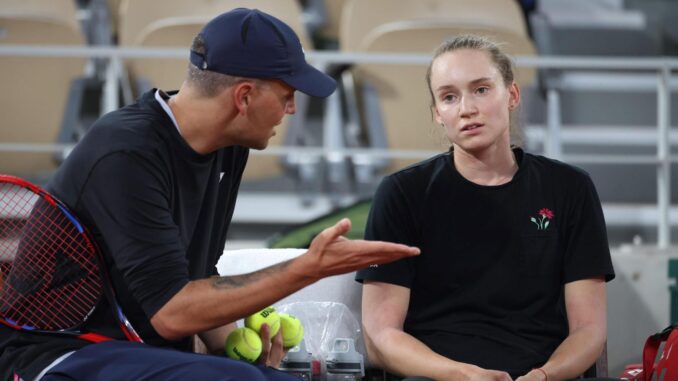
From Court to Controversy: The Stefano Vukov Ban and the Shadow of Allegations
The world of professional tennis, a realm often associated with elegance and sportsmanship, has been rocked by a disturbing narrative involving former coach Stefano Vukov and his one-time charge, Elena Rybakina. While Rybakina has ascended to the pinnacle of the game, achieving Grand Slam success and global recognition, the story of her former coach has taken a dark turn. Vukov has been handed a one-year ban from coaching following an investigation into allegations of abuse, harassment, and an inappropriate romantic relationship with Rybakina during her formative years as a professional. The details emerging paint a troubling picture, raising serious questions about the power dynamics within coach-player relationships and the potential for exploitation.
The ban, imposed by the governing body of professional tennis, stems from a comprehensive investigation into Vukov’s conduct. The allegations against him are multifaceted, encompassing not only emotional and verbal abuse but also claims of harassment and an inappropriate romantic entanglement with Rybakina, which reportedly began when she was still a young player on the cusp of her professional career. The summary of the investigation’s findings paints a concerning portrait of a coach who allegedly abused his position of authority and trust.
The specifics of the alleged abuse and harassment remain largely undisclosed, respecting the privacy of those involved. However, the fact that the investigation led to a one-year ban suggests that the evidence presented was deemed credible and serious enough to warrant disciplinary action. The ban itself sends a clear message that such behavior will not be tolerated within the professional tennis community.
The allegations concerning an inappropriate romantic relationship between Vukov and Rybakina are particularly disturbing, given the power imbalance inherent in the coach-player dynamic. When such relationships develop between an adult authority figure and a young athlete, especially during the crucial developmental years, the potential for exploitation and manipulation is significant. The investigation reportedly explored the nature and timeline of this relationship, considering the age of consent and the potential impact on Rybakina’s career and well-being.
The timing of these revelations is also noteworthy. They have surfaced after Rybakina’s significant success on the court, including her Wimbledon triumph. This raises questions about why the allegations were not brought forward sooner and whether the power dynamics at play may have prevented Rybakina from speaking out earlier. It also highlights the courage it takes for athletes to come forward with such allegations, especially when they involve individuals who have played a significant role in their careers.
The ban imposed on Vukov raises broader questions about the safeguarding mechanisms in place within professional tennis. Are there sufficient protections for young players who may be vulnerable to abuse and exploitation? Are there clear reporting procedures and support systems in place to encourage athletes to come forward if they experience inappropriate behavior? The Vukov case serves as a stark reminder of the need for constant vigilance and improvement in these areas.
The fallout from this case extends beyond the individuals directly involved. It has sent ripples throughout the tennis community, prompting discussions about the responsibilities of coaches, the importance of ethical conduct, and the need for greater transparency and accountability. It has also highlighted the challenges faced by young athletes who are often reliant on their coaches for guidance, support, and career advancement. This dependence can create a power imbalance that makes it difficult for athletes to speak out against abuse or harassment.
The details surrounding the Vukov case remain limited, and it’s essential to respect the privacy of those involved. However, the information that has emerged paints a troubling picture of alleged abuse, harassment, and an inappropriate relationship. The one-year ban imposed on Vukov underscores the seriousness of the allegations and sends a clear message that such behavior will not be tolerated. This case serves as a crucial moment for reflection and reform within the tennis community, a call to strengthen safeguarding measures, promote ethical conduct, and ensure that young athletes are protected from exploitation and abuse. It’s a reminder that the pursuit of excellence in sport should never come at the cost of an athlete’s well-being and that the integrity of the game depends on upholding the highest standards of professionalism and respect.
Leave a Reply